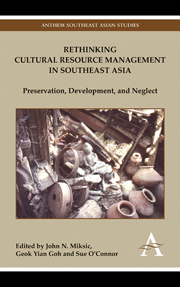Book contents
- Frontmatter
- Contents
- List of Tables and Figures
- Introduction: John N. Miksic
- Southeast Asia (General)
- East Timor
- Chapter 3 Whose Culture and Heritage for Whom? The Limits of National Public Good Protected Area Models in Timor Leste
- Chapter 4 Archaeological Practice in Timor Leste: Past, Present and Future
- Cambodia
- Myanmar
- The Philippines
- Singapore
- Vietnam
Chapter 4 - Archaeological Practice in Timor Leste: Past, Present and Future
from East Timor
Published online by Cambridge University Press: 05 May 2012
- Frontmatter
- Contents
- List of Tables and Figures
- Introduction: John N. Miksic
- Southeast Asia (General)
- East Timor
- Chapter 3 Whose Culture and Heritage for Whom? The Limits of National Public Good Protected Area Models in Timor Leste
- Chapter 4 Archaeological Practice in Timor Leste: Past, Present and Future
- Cambodia
- Myanmar
- The Philippines
- Singapore
- Vietnam
Summary
Introduction
The material remains of the past make up a major, though not the only, portion of what is called “cultural heritage.” These remains are a limited and threatened resource globally. Archaeologists are but one group of people who have interests in controlling, using and conserving these resources. In fact, archaeologists and cultural resource managers may have very different objectives as well as methods, which may at times be in conflict with each other. Additionally, so-called “indigenous” archaeology may present a third set of differing objectives and methods.
In this paper, we review the history of archaeology and cultural resource management (CRM) in Timor Leste in the context of global movements and, in particular, contrast to North America. Our paper also presents qualitative impressions about public attitudes regarding archaeology and cultural heritage in Timor Leste, as well as the results of a pilot survey of public attitudes about archaeology in the town of Manatuto in July 2005 (conducted by Randy Hert who was then a University of Washington archaeology field school student). While the small sample size and range of questions should not be taken to represent public opinion more generally in Southeast Asia, the study does highlight some of the key issues as well as the diversity of opinions held by people in a town in Timor Leste.
- Type
- Chapter
- Information
- Rethinking Cultural Resource Management in Southeast AsiaPreservation, Development, and Neglect, pp. 67 - 88Publisher: Anthem PressPrint publication year: 2011
- 2
- Cited by



